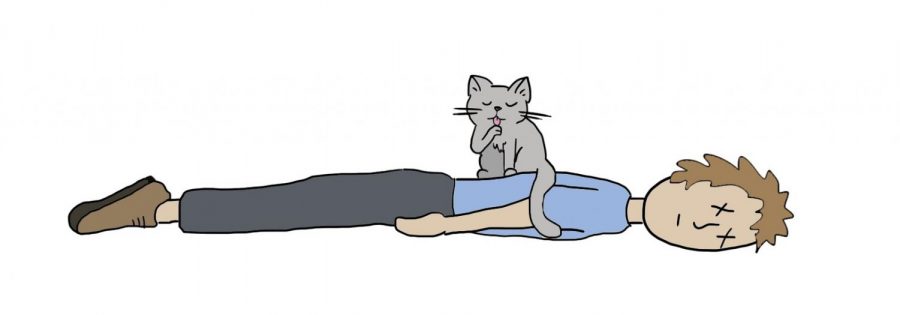‘Don’t F**k With Cats’ is a Binge-Watcher’s Dream
The true-crime documentary raises ethical questions as it entertains.
February 11, 2020
The latest in binge-worthy true crime, “Don’t F**k With Cats,” is a serialized three-part drama recently released exclusively on Netflix. The main focus of the documentary is the largely internet-run manhunt for a person who uploaded videos of themself killing cats anonymously in the early 2010s. As a true-crime doc enthusiast myself, I binged the entire series (each episode capping at about an hour each) in two days.
The series opens with a couple of self-proclaimed “internet nerds” who later serve as the ring-leaders of the e-run investigation. They describe their relationship with the internet and their initial reaction to the heinous video that started it all: a shock video posted to Facebook titled “1 boy 2 kittens,” paying homage to the infamous porn-shock “2 girls 1 cup.” The video depicts a white male caressing two kittens before placing them in a large Ziploc bag and sucking all the air out with a vacuum. This video, of course, sparked mass internet outrage — a Facebook group called “Find the cat vacuumer … for greater justice,” was created almost immediately and gained hundreds of members ready to track down the perpetrator.
This is where the documentary first loses some points. While I occasionally enjoyed the narrative of these random folks who pooled all their internet skills in a Facebook chat to catch a killer, there was too much of a focus on these people’s personal lives. To some degree it’s interesting: Why should I care about some rando who decided to dedicate two years of their life to an obsessive and arguably unworthy cause? Relatably, they’re just like you and me; sitting behind their computer with a strong sense of moral justice, motivated by the lovable cause of cats. But why does it matter that user “BaudiMovin” had just gone through a breakup and was using the fired-up search as a distraction? Why do we need to spend more than 10 minutes talking about it?
That point aside, the documentary gets some things right. There is a serious tension heightened by the mix of relevant interviews, chronological depiction and twists and turns within the story itself. However, the drama was heightened almost too much at times, with the Ari Aster-esque constant musical repetition of “I couldn’t believe my eyes, how could someone do this?” (Claudette, you’re a criminal investigator; what do you mean you couldn’t believe this?) It felt all too similar to “The Act,” a true crime series about Gypsy Rose Blanchard which, while well done in its own right, is not a documentary. I don’t believe a documentary should have to push an element of added drama to an already deranged concept for audiences to be captured. The True Crime genre is meant to have all the legitimacy of non-fiction with all the shock and agitation of a thriller.
Once I was able to get over that point, I was able to enjoy the series for what it is: an exciting, yet borderline over-sensationalized investigation documentary. Like any great Netflix binge, it started pretty inconsequentially yet left me craving more at the end of the first 60-minute segment. Netflix really knew what they were doing when they added that “Next episode playing in…” button, a thinly veiled illusion that we, the viewer, have free will when it comes to their endless stream of content.What makes this doc so successful, however, is what makes most fictional television work: a crazy and fascinating story with believability that keeps you wondering and motivates you to want to learn more. If it hadn’t been for Luka Magnotta, the man behind the acts of cruel animal abuse that eventually led to his murdering of a real human being, we would not have this jaw-clenching thriller to begin with.
This point brings some contention to the moral aspect of viewing and supporting such a documentary, which is brought up among the folks leading the manhunt. Were they complicit in Magnotta’s crimes? Luka was a man so hell-bent on attention-seeking that he would go to the lengths of creating numerous aliases and dozens of fan and sock-puppet accounts, as well as an alibi 1.5 years before the actual murder took place, stringing his audience along on his path of killings. This hanging question of “Is our attention to these acts what fueled them in the first place?” is two-fold for me. On one hand, it’s incredibly valuable to frame a doc in such a way that the audience and the movie’s antagonists, and even protagonists, all have one commonality: All are frequent internet users. However, there’s something hypocritical about Netflix going to great lengths to produce this documentary — the sheer amount of money used to promote it, just for them to direct the blame toward you, the audience, after three hours of time spent because they promised something worth your time and attention. Don’t guilt-trip me just because you have successful advertising, Netflix.











